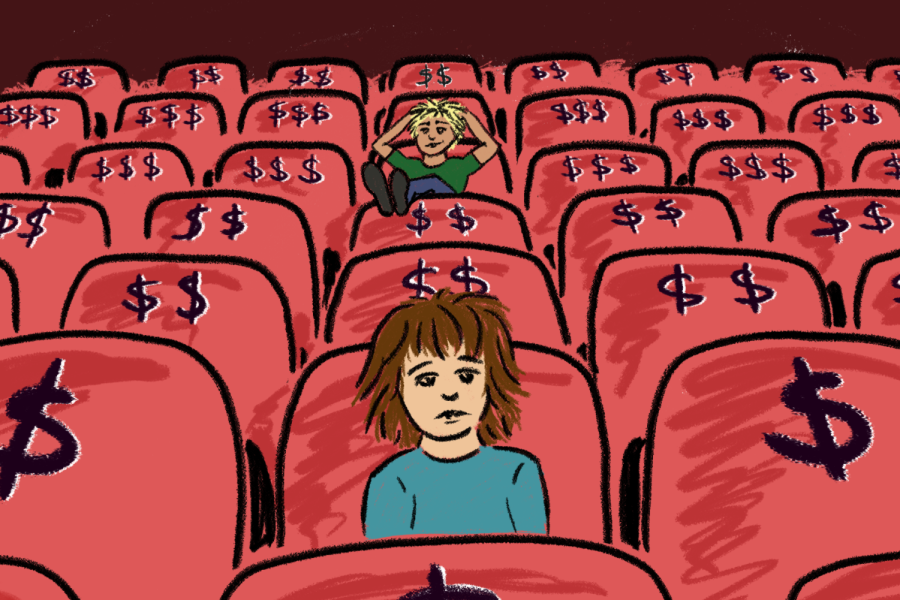We come to this place for magic. We come to AMC theaters to laugh, to cry, to care…and to pay extra money for premium seats?
Nicole Kidman never mentioned that!
AMC Theaters made a startling announcement last month that their one-size-fits-all pricing system would be overhauled. Rather than charging customers a fixed price of $13-16, the company will be moving to a fluid pricing system charging premium rates for premium seats, called “Sightline.” If you’re willing to deal with neck pain, you can sit in the front rows for a lower price.
If you’d like to sit in a comfortable spot, however, get ready to pay up.
The difference of pricing is only a couple dollars for now, but this signals a broader issue for the movie industry: AMC’s new tiered pricing system is unnecessarily exclusionary.
This comes at a time where cost of living, income inequality and cost of goods and services are all on the rise.
As of Sept. 2022, a LendingClub report found that 63% of Americans are living paycheck-to-paycheck. A Bloomberg report one year prior found that the top 1% of earners in the United States own more wealth than the entirety of the middle class – furthering a class divide that’s existed for decades.
One of the appeals of movie theaters is that people from all walks of life and socioeconomic backgrounds can come together and experience art together. It’s not like an arena concert where you want to be as close to Harry Styles as possible. Or a UFC match where you want to be on the frontlines, drenched in the blood and sweat of the fighters.
Financially speaking, every movie theater seat is supposed to be equal.
“Happy Feet 2” and “Hobbit” star Elijah Wood summed the situation up perfectly in a Twitter post in February: “The movie theater is and always has been a sacred democratic space for all and this new initiative by @AMCTheatres would essentially penalize people for lower income and reward for higher income.”
This doesn’t necessarily mean that movie-goers will flock to Regal Cinemas to avoid these one or two dollar fees, but it could spell future changes that alienate lower-income audiences.
AMC’s subscription service, A-List, is unaffected by this change. As a long-time A-Lister, it is unlikely I will boycott the company and flock to another theater chain. But I am disappointed in the company’s misguided policy changes and the lack of alternative options.
Paying $24.99 a month to see 12 movies is hard to beat. For context, if I saw 12 movies in San Diego in a month without the A-List pass, it would cost roughly $187.
For anyone who is willing to pay that monthly fee, AMC’s new policy is no big deal. For individual buyers, though, this can become a problem.
Movie theaters have been a battleground for online discourse in the last few years. First, movie-goers held heated debates over the use of phones in movie theaters. Then, consumers were given the appealing option of enjoying movies from the comfort of their own homes.
The highly-documented streaming wars of the 2020s saw the biggest distribution companies creating their own streaming services. Netflix’s monopolization of the at-home movie market was no more.
Audiences have the choice to subscribe to Paramount+, Hulu, Disney+, Apple TV+ and Peacock, to name a few. Some have already fizzled out, like everyone’s favorite news source, CNN+. Even Netflix’s success has flatlined, as their revenue slightly declined in quarters three and four of 2022.
Movie theater chains are struggling to adapt to an ever-changing market, and this decision is a clear demonstration of that.
The movie theater industry has also been struggling financially since the beginning of COVID-19. The tiered-ticket pricing – along with the recent push to bring AMC popcorn to store shelves – are two of the company’s latest campaigns to bring in revenue to help combat AMC’s 14th consecutive quarterly loss.
This change in policy can give AMC a few extra dollars per ticket, but hurts them immensely in terms of brand image and strategy.
I know more about movies than I do about managing the finances of a $3.4 billion company, but what I will say is this: making working-class people fight over top-tier seats isn’t the move.
As Nicole Kidman said, we come to this place for magic.
Not for exclusionary policies.







